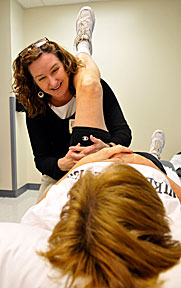A physical therapist and a teacher have something profoundly important in common: Both have to know when it’s best to push their patient or student and when it’s best to provide a little tender love and care.
 |
| Patricia Perez works with a patient in the Outpatient Physical Therapy Department at UAB Hospital. |
Perez is recognized throughout Alabama as an expert clinician and master teacher, and she recently was awarded the Marilyn Gossman Award for Professionalism in Physical Therapy by the Alabama Physical Therapy Association. The award honors outstanding professionalism in physical therapy service, practice, education and research. Recipients must have positively and substantially affected the shape, scope and quality of physical therapy practice in Alabama in a manner that significantly improves the ability of physical therapy professionals to practice.
One patient described Perez as “nothing short of a miracle worker.” Another described her as “an excellent communicator; reading her patients so well and knowing when to provide a gentle push, a caring hand or a good shove.”
Her longtime mentor and former UAB physical therapy clinician and instructor Garvice Nicholson, says Perez is “one of the most compassionate people I know. If you are fortunate to be one of Patty’s patients, students or co-workers, you have a tireless and dependable advocate giving you the best she can give.”
Perez recently spoke with the Reporter about the award and the balance of being a therapist and teacher.
Q. What did winning the Marilyn Gossman award mean to you?
A. It’s such an honor to be recognized by your colleagues and by the patients that you serve. This award has special meaning for me since it was named for such an important person in the physical therapy history of this city and state. Marilyn Gossman was such a force in developing and promoting our profession through her work as the director of the PT school at UAB and through her tireless service in our national organization. All of us in this state will be indebted to her forever. Receiving an award named after her provides inspiration to continue to grow in a profession that I love.
Q. What is the greatest reward of being a professor?
A. The opportunity to share my love of this profession on a daily basis is quite rewarding. It’s always inspiring to see students become more confident with skills and knowledge as the coursework progresses. Our students are so bright — their intellectual curiosity makes me learn something new almost everyday. I always contend that being in the classroom makes me a better clinician and being in the clinic makes me a better teacher.
Q. And the greatest reward of being a physical therapist?
A. Quite simply, it is the opportunity to make an important difference in someone’s life. This can range from helping a patient regain strength and mobility to resume basic activities such as walking, training individuals to use optimal body mechanics to prevent injuries at work or alleviating pain to allow for meaningful participation in family and work activities. Physical therapy can be such an important component of enabling individuals to achieve maximal function, and to be a part of that is an extraordinary thing.
Q. How do you judge when it is time to push a student or patient harder than they may want to be pushed?
A. That can be an intuitive call at times, but I think it comes down to knowing your patient or student and being able to communicate effectively. Additionally, it requires that you take the time to understand what is important to the patient/student so that both parties are on the same page when it comes to goals/outcomes.
Q. What is the most important skill for your students to learn?
A. Communication is without a doubt the most important thing. An effective therapist must be able to effectively communicate with patients/clients of different ages and backgrounds. Ineffective communication skills adversely affect patient-therapist trust, patient compliance and eventually treatment outcomes. Truly listening to patients will go a long way toward achieving success with them. In addition, there are so many other members of the health-care team that the PT must communicate with in order to optimally care for the patient.
Q. Why do you enjoy the therapist-patient relationship?
A. The opportunity to interact with people from so many different walks of life is very special. Just as I learn from my students, I learn from my patients every day. They have expanded my knowledge in so many areas and each of them has contributed to my growth as a PT. For that, I will always be grateful to each of them.